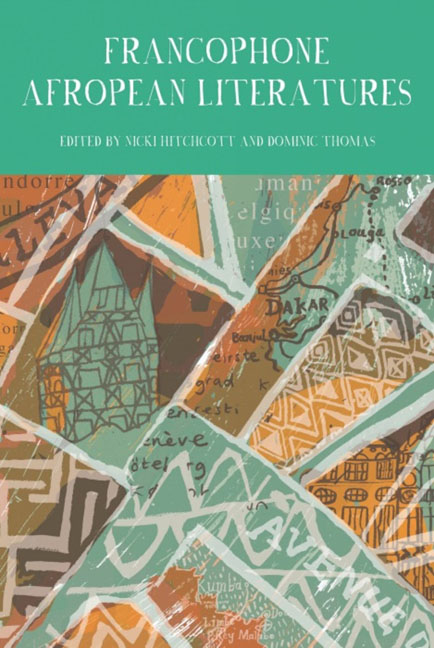Book contents
- Frontmatter
- Contents
- Introduction: Francophone Afropeans
- Essays
- Afropeanism and Francophone Sub-saharan African Writing
- The Transatlantic Poetics of Fatou Diome
- Corps Sans Titre: ‘Fleshiness’ and Afropean Identity in Bessora's 53 Cm
- Already Here: Sami Tchak's Afropean Generation
- Paris Polar: Afropean Noir in the City of Light
- Mapping Afropea: The Translation of Black Paris in the Fiction of Alain Mabanckou
- Relighting Stars and Bazaars of Voices: Exchange and Dialogue in Leonora Mianos Tels Des astres eteints and Alain Mabanckous Black Bazar
- Sex and the Afropean City: Léonora Miano's Blues Pour Élise
- Towards an Afropean Cosmopolitanism: Hospitality, Friendship and the African Immigrant
- Afropean Masculinities as bricolage
- Short Stories
- Notes on Contributors
- Index
Corps Sans Titre: ‘Fleshiness’ and Afropean Identity in Bessora's 53 Cm
from Essays
- Frontmatter
- Contents
- Introduction: Francophone Afropeans
- Essays
- Afropeanism and Francophone Sub-saharan African Writing
- The Transatlantic Poetics of Fatou Diome
- Corps Sans Titre: ‘Fleshiness’ and Afropean Identity in Bessora's 53 Cm
- Already Here: Sami Tchak's Afropean Generation
- Paris Polar: Afropean Noir in the City of Light
- Mapping Afropea: The Translation of Black Paris in the Fiction of Alain Mabanckou
- Relighting Stars and Bazaars of Voices: Exchange and Dialogue in Leonora Mianos Tels Des astres eteints and Alain Mabanckous Black Bazar
- Sex and the Afropean City: Léonora Miano's Blues Pour Élise
- Towards an Afropean Cosmopolitanism: Hospitality, Friendship and the African Immigrant
- Afropean Masculinities as bricolage
- Short Stories
- Notes on Contributors
- Index
Summary
In the field of French literary studies, the rise of ‘francophone’ studies is one of the many signs of a shift in priorities and in world–views. Originally a term used to designate the study of the cultures of former French colonies, francophone has become more problematic as a term due, in part, to the perception that it perpetuates a colonial centre–periphery model. I have argued elsewhere that terms such as francophone are increasingly untenable because of more fundamental shifts, in particular the breakdown of the nation–state as a bounded socio–economic and linguistic community (Nimis, 2013). Companies and jobs, texts and languages, as well as human beings flow across national political borders with an ease and frequency that is unprecedented in the modern era. New identities arise which are not only irreconcilable with national categories, but because of new mobilities, hard to pin to geographical categories. In the realm of theory and criticism, the response to these changing realities has been to seek new paradigms for the study of culture, and to find new language for speaking about postnational human communities.
It is in this context that the term Afropean has become useful given that it incorporates the term European – which designates a postnational economic community (the EU) – while also referring to ‘whites’ as a racial category. For the prefix ‘Euro’ is substituted ‘Afro’, which, like Euro, refers to both a continent (i.e. a larger than ‘national’ formation) and a racial category. Afropeanism is thus more grounded in this duality than more universalizing terms such as négritude or the more recent ‘Afropolitan’ (De Meyer, 2009). Some critics have used the term ‘Afro–European’ (Brancato, 2008; Crumly Deventer and Thomas, 2011), but Afropean points to a group with dual cultural and political identities without any basis or investment in the national, either as a source of legitimacy or a target of resistance. The absence of a hyphen in the term therefore registers the integrity of human subjects, thus designating a seamless mixture and crossing, across distance and across imagined categories of humans (black and white).
While the term itself is relatively new, the broader experience it seeks to encompass has been a concern in literature for some time.
- Type
- Chapter
- Information
- Francophone Afropean Literatures , pp. 48 - 63Publisher: Liverpool University PressPrint publication year: 2014



